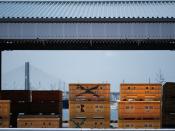Following up on the text's discussion of inertia and alternative organizational forms in the future, address the question of innovativeness/creativity versus the task of meeting organizational goals, and specifically, in regard to defending the organization's progress (or lack of it) to the governing board in a given business or university. Keep the issues of organizational size and type of products or service alive in the discussion. In regard to materials, compare organizations which produce a uniform product, such as a chemical, with those which might produce custom products (machinery).
The discussion should get to be complicated very quickly. That's the whole idea. Organizational models we have at our disposal are, to put it simply, inadequate. Even the Kanter models cannot cover all of the possibilities relating to the questions and issues I outlined above.
Anthropologists use the term "artifact" to refer to material culture (in our culture, machines, tools, pencils, etc.).
M. Estellie Smith (1982:58) has coined the term "mentifact" to refer to social forms in culture. Ironically, modern societies have been able to organize themselves to produce scientific discoveries which have resulted in incredible developments in the realm of artifacts (computers, for example). These same societies, however, have not been able to reorganize themselves to deal with the consequences of using such developments, remain competitive worldwide, and retain a cutting-edge, innovative organizational mentality. A major reason is that both our governments and corporate forms (especially in the Western world) have experienced what may be referred to as organizational inertia.
What's the answer? It may lie in the budgets of both our governments and corporations. I refer to the allocations of funds to create needed mentifacts (new organizational forms). We spend what seems to be limitless amounts to develop military hardware, but comparatively little in finding ways to produce international...


